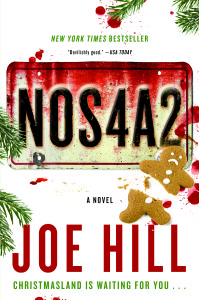Read Like A Writer: The NOS4A2 edition
 This time of year is wonderful and joyous, unless you work in retail and/or have no control over the music you listen to. Then this time of year is a special brand of horrific. Joe Hill captures the horror of the season in NOS4A2 with bad teeth, special vehicles, and Christmas music. NOS4A2 is about childhood and growing up. It’s an awesome blend of horror and the supernatural. Hill also blends pop culture references with the kind of writing I’ve been taught to appreciate (few adverbs, the narrator doesn’t overuse exclamation points or ellipses, and a good pace). The ending is satisfying, it’s worth reading the six hundred something pages that precede it. There’s nothing I hate more in a story than a weak ending– I can forgive anything but the feeling of being left out to dry by the author, either by design or an accident. My biggest complaint is a lack of diversity. Would it kill anyone to have an important character also be a minority (Native American, Latino, queer)?
This time of year is wonderful and joyous, unless you work in retail and/or have no control over the music you listen to. Then this time of year is a special brand of horrific. Joe Hill captures the horror of the season in NOS4A2 with bad teeth, special vehicles, and Christmas music. NOS4A2 is about childhood and growing up. It’s an awesome blend of horror and the supernatural. Hill also blends pop culture references with the kind of writing I’ve been taught to appreciate (few adverbs, the narrator doesn’t overuse exclamation points or ellipses, and a good pace). The ending is satisfying, it’s worth reading the six hundred something pages that precede it. There’s nothing I hate more in a story than a weak ending– I can forgive anything but the feeling of being left out to dry by the author, either by design or an accident. My biggest complaint is a lack of diversity. Would it kill anyone to have an important character also be a minority (Native American, Latino, queer)?
In lieu of a review (check GoodReads for that), I’ll give you three reasons why reading NOS4A2 will make you a better writer. In order for you to understand the advice I give without having already read the book I’ve included a short character list.
Victoria McQueen- Protagonist. We want her to win the day.
Charlie Manx- Antagonist. We want him to lose.
Bing Partridge- Supporting character. We’d also appreciate him losing.
Nurse Thorton- Minor character. She’s a good person and we have no ill will towards her but we might not remember her name the next time we meet if no one re-introduces us.
(This is a super incomplete list. There are characters I’d like to list, crucial and passing, that I’m not because I want you to experience as much of the first time magic as possible.)
1. This is paraphrased from writing advice Joe Hill gave in his Google Hangout with John Scalzi— set up the world immediately. (His advice uses a bullshit metaphor and is worth the minute and change it takes to watch the video.)
Read the prologue and write down what you consider the rule(s) of the world. What do you accept as possible in this world based on the prologue?
2. Minimize your narrator, maximize your characters.
This advice only applies to those writing in third person. If your narrator isn’t a character in the story, don’t do anything that calls attention to the narrator. Things that call attention to the teller instead of the story include: exclamation points, ellipses, and adverbs. It’s also lazy writing for a third person narrator to use a lot exclamation points, ellipses, and adverbs.
Read and take notes on each chapter, then compare your notes from a Manx chapter to a Vic chapter or Nurse Thorton’s chapter to a Bing Partridge chapter. (For instance sometimes Manx is saving children and sometimes he’s kidnapping them. Also the narrator never gets so excited that he uses an exclamation point– even when he’s tailing Manx or Bing, both of whom love exclamation points and using all capital letters.)
3. Flawed hero, sympathetic villain.
Vic is not a Mother Theresa-Girl Scout hybrid who does the right thing because she always does the right thing. Vic seldom does the right thing and knows it. Vic carries her demons and baggage with her everywhere. It’s a cliche that the road to Hell is paved with good intentions and it also only paints half the picture: the road to Hell is paved with both good and bad intentions and Vic has both of them. What’s great about this story is that as a reader you don’t stop rooting for Vic when she fucks up– if anything you hope harder. Like Whedon says everyone loves a good underdog story.
On the flip-side Manx always believes he’s in the right. Everything he does is in service to his ideals. Manx’s perspective and conviction make it easier to read him. It doesn’t stop me from wanting him housed in a supermax prison but it does make me want him housed in the psychiatric wing. (Not because deserves less punishment but because he requires way more supervision than the average scumbag. If given the chance he’d execute everyone on his cell block.)
As you’re reading, note what you like about Vic and what you don’t. Do the same for Manx. What makes the bastard a little more human? Do it for all the characters (or at least all the important-to-you characters). It’s time consuming, but it’s worth it because at the end you’ll have a great list of characteristics you find important to make believable characters to you (and if you believe in the characters, most of the time so won’t the reader).
There are more reasons to read NOS4A2 than these three, but these were the first three to come to mind. If you start reading it, and don’t like it, don’t put it down. Keep reading, noting what you dislike. Knowing what you dislike and why is important as knowing what you like and why. So give it a read and tell me what you think. (PS-If you like Hill’s writing you can check out his 140 characters on Twitter and his musings on Tumblr.) (PPS- Read until there are no more printed words on the page. Hill novel’s are like Marvel movies, they are hidden gems of story if you stick through the credits. And if you want to be a writer you need to stick through the credits.)

One thought on “Read Like A Writer: The NOS4A2 edition”